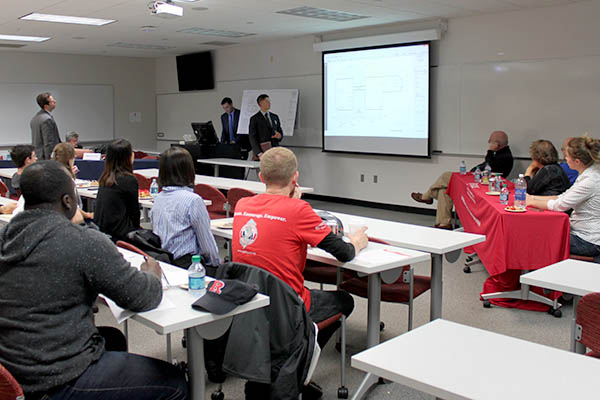 To help prepare for their role in municipal planning board meetings, Bloustein students are given the opportunity to participate in a mock hearing, organized by the school’s Office of Student and Academic Services. The mock hearing simulates a public hearing on an already-approved plan, enabling students to understand the many points of view and the tough tasks involved in the final decision.
To help prepare for their role in municipal planning board meetings, Bloustein students are given the opportunity to participate in a mock hearing, organized by the school’s Office of Student and Academic Services. The mock hearing simulates a public hearing on an already-approved plan, enabling students to understand the many points of view and the tough tasks involved in the final decision.
Over the course of two hours on a Wednesday afternoon late in September, members of the Bloustein faculty stepped into the shoes of the Hoboken Zoning Board of Adjustment’s (ZBA) members and debated the merits of a proposed ‘Academic Gateway’ for Stevens Institute of Technology. Presenting on the Stevens’ behalf were planners, engineers and lawyers for the Stonefield Engineering firm, based out of Rutherford, NJ. Over the course of the session, these experts had to argue ‘under oath’ that their client’s proposal to turn two properties on the north- and southeast corners of Sixth and Hudson Street intersection warranted three zoning variances. As a career-preparation session, this gave students a better idea of how these municipal board meetings are carried out.
Representing Stevens Institute’s legal counsel was Jason Tuvel, an attorney with Gibbons P.C., who led the discussion and guided his ‘witnesses’—civil engineer James Kinosian, traffic engineer Matthew Seckler and John McDonough, a licensed professional planner—to give testimony in favor of the proposed development. Over the course of their presentations, each ‘witness’ offered expert testimony on the site plan’s merits and Stevens’ proposed responses to any potential issues.
Pulling from the actual ZBA meetings, the community surrounding the building had issue with the building’s proposed height, the kinds of research that would be conducted and the associated increase in activity it would bring to the neighborhood. As this was an abbreviated summary of the various meetings Stonefield and Stevens had to attend in real life, Mr. Tuvell took the time to have each of the witnesses address these complaints in the manner in which they were addressed to the actual zoning Board in Hoboken. Namely, from a planning perspective, Stonefield argued that the new building would complete the built environment it would be situated in, while Stevens worked with the community to limit access hours to ensure students and faculty would not disrupt the community late at night.
From a traffic perspective, Stonefield ran vehicle and pedestrian counts and used conservative engineering estimates to determine that the buildings would not add any significant amount of traffic to the local roads. Finally, aware that parking is often what kills large-scale projects, Stonefield tied this project to their proposed parking lot construction for Stevens. If taken together, there would be ample parking for any new traffic that the Academic Gateway generated.
Throughout the hearing, the Board—comprised of Professors Stuart Meck (as the chairman), Frank Popper, Lyna Wiggins, and Kelcie Ralph—asked thoughtful questions and challenged many of the proposal’s assumptions and methodologies. The audience was also encouraged to ask questions and, when appropriate, Mr. Tuvell and the other witnesses broke character and explained concepts that might not have been clear.
At the conclusion of the presentations, the Board voted to approve the project, mimicking the decision the Hoboken Zoning Board of Adjustment made. Students were then invited to network with the presenters, many of whom received degrees from Rutgers and/or the Bloustein School.
